#dynamic market
Explore tagged Tumblr posts
Text
Exploring Investment Options in India: A Guide to Financial Growth and Security

Investment options in India encompass a diverse array of opportunities that enable individuals to grow their wealth and secure their financial future. Investing involves allocating resources in various avenues with the goal of generating returns over time. This practice is fundamental for individuals looking to build wealth, beat inflation, and achieve long-term financial goals.
The importance of investing in India stems from the country's robust and rapidly growing economy. With a burgeoning middle class and a dynamic market, numerous investment avenues present themselves to both seasoned investors and beginners. Understanding these options is crucial to making informed decisions aligned with individual financial objectives.
One of the most traditional yet reliable investment avenues is the stock market. India's stock exchanges, such as the National Stock Exchange (NSE) and Bombay Stock Exchange (BSE), provide opportunities for individuals to invest in a wide range of companies across sectors. Stocks offer the potential for capital appreciation and dividends, albeit with inherent risks that require a prudent approach and research-driven decisions.
Another popular investment avenue is mutual funds. These professionally managed funds pool money from various investors to invest in diversified portfolios of stocks, bonds, or other securities. They offer diversification, liquidity, and professional management, making them an accessible option for investors with varying risk appetites.
Fixed-income instruments like government-backed schemes, corporate bonds, and fixed deposits (FDs) from banks offer stable returns and security, albeit with comparatively lower returns than equities. These serve as a conservative option for investors seeking stability and capital preservation.
Real estate stands as a tangible and historically appreciating asset class in India. Investing in properties, be it residential or commercial, can potentially yield rental income and capital appreciation. However, this avenue demands significant capital, long-term commitment, and careful assessment of market trends.
In recent years, alternative investment options such as gold, commodities, and digital assets like cryptocurrencies have gained traction among investors seeking diversification and higher returns. These avenues come with their own set of risks and require a thorough understanding before venturing into them.
The significance of investing in India lies in the potential to generate wealth over time. By carefully diversifying across various investment avenues, individuals can mitigate risks and capitalize on growth opportunities. Moreover, investing encourages financial discipline, compounding, and a proactive approach towards achieving long-term financial objectives like retirement planning, wealth creation, and achieving financial independence.
In conclusion, exploring investment options in India is pivotal for individuals aiming to secure their financial future and achieve their life goals. Each investment avenue carries its own risk and return profile, and thus, a well-thought-out investment strategy that aligns with individual financial goals and risk tolerance is imperative. With prudent decision-making and a long-term perspective, investing in India offers the potential for wealth creation and financial security.
This post was originally published on: Foxnangel
#investment options in india#investing in india#Invest In India#dynamic market#indian stock market#mutual funds#diversified portfolios#financial goals#fdi in india#foxnangel
1 note
·
View note
Text
Unravelling the Expanding Landscape of Market Research in India
The size of the market research industry is rapidly expanding, driven by factors like rising consumerism, data-driven insights, and technological advancements. As businesses recognize the intrinsic value of consumer insights, market research becomes a strategic imperative for decision-making and customer-centric strategies.
#Analysis#awareness#Brand Strategy#business#business insights#competitive analysis#Consumer behavior#data#data analysis#discover#dynamic market#exploring#growth#India#industry#industry research#insights#landscape#market analysis#market dynamics#market growth#Market intelligence#market opportunities#market outlook#market report#market research#market segmentation#market size#market statistics#market study
0 notes
Text

round 1.png
#alien stage#alnst#mizisua#alnst mizi#alnst sua#i was reading a mizisua fic earlier and it suddenly clicked#that this is their dynamic#which is so... gjkfdjkg#you know the original could happen in an au#if you take sua being good at maths -> getting involved in business#maybe she would end up involved in the stock market. which is a terrible future so ig she's doomed no matter what
276 notes
·
View notes
Text
This is an answer to a question that nobody asked me, but I saw it asked on Gina's blog @twopoppies and for some reason felt like contributing my opinion, hope yall don't mind.
The question was:
Why is it that Louies are so much more tolerant of Larry Stylinson than Harries?
It is my impression that this is the case, or rather was the case (and I say was for a reason*), due to how their careers have progressed differently, with timing playing a huge role in it. For starters, it's important to emphasize how Harry's marketing and image have always been tied to the sex appeal persona created for him. He was marketed like that as a 16 year old, and it continued like that through all of 1D and his solo career. So the fans that comprise the harries ended up falling in that category for the most part. Additionally, in my opinion, the fact that Harry began his solo career much earlier, and got a high level of success right with his 1st solo album, led him to gain a much larger fanbase much quicker. Whereas Louis' solo career took several years to grow like that, so his fanbase stayed smaller for longer, and as a result it was more likely that he'd have more larrie fans than Harry's fanbase. It's strictly a numbers game.
Now looking at how Louis' been marketed, he was not really marketed as a sex symbol for fans to desire. He was always marketed as safe, a friend, someone you could trust, someone fun. This was done through 1D via his relationship with Eleanor. They always painted that relationship as a steady, long term relationship. From the start saying that she was a childhood sweetheart, and a girl he brought home to meet the family. So that painted him as unavailable as a love interest to the fanbase at large. He was also always funny, so Louis came across as a friend who you could trust and have fun with. Someone to rely on.
I would say that this largely carried on through the beginnings of Louis' career, in part because it was slowed down due to covid delaying it, but also due to its marketing also relying on the friend image. He was a lad, sweet and caring, but a friend. His fanbase grew, but I think there was still a level of balance between solo fans and louie-larries. The pandemic brought in a boom of new fans. People who were in lockdown with nothing to do who fell down the rabbit hole of Larry. So while Louis' fanbase grew, I would say it grew a lot in larries because of 2020. FITF is where things began to change and his fanbase really grew with the larger public. I think this can be attributed to his massive tour and social media presence. His styling and image was sexier during this tour, so he also grew a lot of fans who now viewed him as a sex symbol, someone to desire. That paired with his reported split from Eleanor made him available, which in turn helped grow his image of the "rockstar boyfriend" for people to desire. I think this was also largely encourage through more frequent online discussions of how hot Louis is. Something that wasn't really commonly a part of fandom discussion prior to 2020. Whereas for Harry, it has always been a part of discussion, because it's always been how he has been marketed.
*Overall I think this is rapidly changing, and we've already seen it in how Louis' fanbase has changed through FITF. I don't think the fandom at large will have this dynamic for long, as it grows and changes.
Anyways, this is my opinion. If others have a different opinion or would like to contribute, feel free to share.
#harry's image#louis' image#fandom dynamics#harry's marketing#louis' marketing#harries#louies#larries#larry stylinson
96 notes
·
View notes
Text
FTC vs surveillance pricing
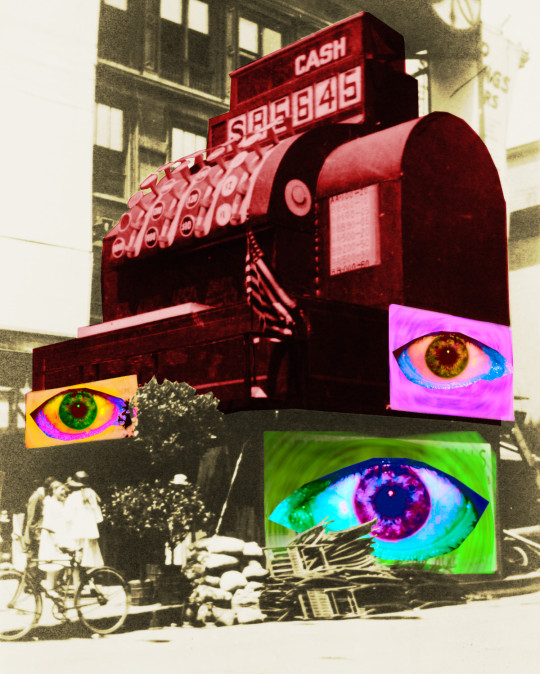
Support me this summer on the Clarion Write-A-Thon and help raise money for the Clarion Science Fiction and Fantasy Writers' Workshop!

In the mystical cosmology of economics, "prices" are of transcendental significance, the means by which the living market knows and adapts itself, giving rise to "efficient" production and consumption.
At its most basic level, the metaphysics of pricing goes like this: if there is less of something for sale than people want to buy, the seller will raise the price until enough buyers drop out and demand equals supply. If the disappointed would-be buyers are sufficiently vocal about their plight, other sellers will enter the market (bankrolled by investors who sense an opportunity), causing supplies to increase and prices to fall until the system is in "equilibrium" – producing things as cheaply as possible in precisely the right quantities to meet demand. In the parlance of neoclassical economists, prices aren't "set": they are discovered.
In antitrust law, there are many sins, but they often boil down to "price setting." That is, if a company has enough "market power" that they can dictate prices to their customers, they are committing a crime and should be punished. This is such a bedrock of neoclassical economics that it's a tautology "market power" exists where companies can "set prices"; and to "set prices," you need "market power."
Prices are the blood cells of the market, shuttling nutrients (in the form of "information") around the sprawling colony organism composed of all the buyers, sellers, producers, consumers, intermediaries and other actors. Together, the components of this colony organism all act on the information contained in the "price signals" to pursue their own self-interest. Each self-interested action puts more information into the system, triggering more action. Together, price signals and the actions they evince eventually "discover" the price, an abstraction that is yanked out of the immaterial plane of pure ideas and into our grubby, physical world, causing mines to re-open, shipping containers and pipelines to spark to life, factories to retool, trucks to fan out across the nation, retailers to place ads and hoist SALE banners over their premises, and consumers to race to those displays and open their wallets.
When prices are "distorted," all of this comes to naught. During the notorious "socialist calculation debate" of 1920s Austria, right-wing archdukes of religious market fundamentalism, like Von Hayek and Von Mises, trounced their leftist opponents, arguing that the market was the only computational system capable of calculating how much of each thing should be made, where it should be sent, and how much it should be sold for.
Attempts to "plan" the economy – say, by subsidizing industries or limiting prices – may be well-intentioned, but they broke the market's computations and produced haywire swings of both over- and underproduction. Later, the USSR's planned economy did encounter these swings. These were sometimes very grave (famines that killed millions) and sometimes silly (periods when the only goods available in regional shops were forks, say, creating local bubbles in folk art made from forks).
Unplanned markets do this too. Most notoriously, capitalism has produced a vast oversupply of carbon-intensive goods and processes, and a huge undersupply of low-carbon alternatives, bringing the human civilization to the brink of collapse. Not only have capitalism's price signals failed to address this existential crisis to humans, it has also sown the seeds of its own ruin – the market computer's not going to be getting any "price signals" from people as they drown in floods or roast to death on sidewalks that deliver second-degree burns to anyone who touches them:
https://www.fastcompany.com/91151209/extreme-heat-southwest-phoenix-surface-burns-scorching-pavement-sidewalks-pets
For market true believers, these failures are just evidence that regulation is distorting markets, and that the answer is more unregulated markets to infuse the computer with more price signals. When it comes to carbon, the problem is that producers are "producing negative externalities" (that is, polluting and sticking us with the bill). If we can just get them to "internalize" those costs, they will become "economically rational" and switch to low-carbon alternatives.
That's the theory behind the creation and sale of carbon credits. Rather than ordering companies to stop risking civilizational collapse and mass extinction, we can incentivize them to do so by creating markets that reward clean tech and punish dirty practices. The buying and selling of carbon credits is supposed to create price signals reflecting the existential risk to the human race and the only habitable planet known to our species, which the market will then "bring into equilibrium."
Unfortunately, reality has a distinct and unfair leftist bias. Carbon credits are a market for lemons. The carbon credits you buy to "offset" your car or flight are apt to come from a forest that has already burned down, or that had already been put in a perpetual trust as a wildlife preserve and could never be logged:
https://pluralistic.net/2022/03/18/greshams-carbon-law/#papal-indulgences
Carbon credits produce the most perverse outcomes imaginable. For example, much of Tesla's profitability has been derived from the sale of carbon credits to the manufacturers of the dirtiest, most polluting SUVs on Earth; without those Tesla credits, those SUVs would have been too expensive to sell, and would not have existed:
https://pluralistic.net/2021/11/24/no-puedo-pagar-no-pagara/#Rat
What's more, carbon credits aren't part of an "all of the above" strategy that incorporates direct action to prevent our species downfall. These market solutions are incompatible with muscular direct action, and if we do credits, we can't do other stuff that would actually work:
https://pluralistic.net/2023/10/31/carbon-upsets/#big-tradeoff
Even though price signals have repeatedly proven themselves to be an insufficient mechanism for producing "efficient" or even "survivable," they remain the uppermost spiritual value in the capitalist pantheon. Even through the last 40 years of unrelenting assaults on antitrust and competition law, the one form of corporate power that has remained both formally and practically prohibited is "pricing power."
That's why the DoJ was able to block tech companies and major movie studios from secretly colluding to suppress their employees' wages, and why those employees were able to get huge sums out of their employers:
https://en.wikipedia.org/wiki/High-Tech_Employee_Antitrust_Litigation
It's also why the Big Six (now Big Five) publishers and Apple got into so much trouble for colluding to set a floor on the price of ebooks:
https://en.wikipedia.org/wiki/United_States_v._Apple_(2012)
When it comes to monopoly, even the most Bork-pilled, Manne-poisoned federal judges and agencies have taken a hard line on price-fixing, because "distortions" of prices make the market computer crash.
But despite this horror of price distortions, America's monopolists have found so many ways to manipulate prices. Last month, The American Prospect devoted an entire issue to the many ways that monopolies and cartels have rigged the prices we pay, pushing them higher and higher, even as our wages stagnated and credit became more expensive:
https://prospect.org/pricing
For example, there's the plague of junk fees (AKA "drip pricing," or, if you're competing to be first up against the wall come the revolution, "ancillary revenue"), everything from baggage fees from airlines to resort fees at hotels to the fee your landlord charges if you pay your rent by check, or by card, or in cash:
https://pluralistic.net/2024/06/07/drip-drip-drip/#drip-off
There's the fake transparency gambit, so beloved of America's hospitals:
https://pluralistic.net/2024/06/13/a-punch-in-the-guts/#hayek-pilled
The "greedflation" that saw grocery prices skyrocketing, which billionaire grocery plutes blamed on covid stimulus checks, even as they boasted to their shareholders about their pricing power:
https://prospect.org/economy/2024-06-12-war-in-the-aisles/
There's the the tens of billions the banks rake in with usurious interest rates, far in excess of the hikes to the central banks' prime rates (which are, in turn, justified in light of the supposed excesses of covid relief checks):
https://prospect.org/economy/2024-06-11-what-we-owe/
There are the scams that companies like Amazon pull with their user interfaces, tricking you into signing up for subscriptions or upsells, which they grandiosely term "dark patterns," but which are really just open fraud:
https://prospect.org/economy/2024-06-10-one-click-economy/
There are "surge fees," which are supposed to tempt more producers (e.g. Uber drivers) into the market when demand is high, but which are really just an excuse to gouge you – like when Wendy's threatens to surge-price its hamburgers:
https://prospect.org/economy/2024-06-07-urge-to-surge/
And then there's surveillance pricing, the most insidious and profitable way to jack up prices. At its core, surveillance pricing uses nonconsensually harvested private information to inform an algorithm that reprices the things you buy – from lattes to rent – in real-time:
https://pluralistic.net/2024/06/05/your-price-named/#privacy-first-again
Companies like Plexure – partially owned by McDonald's – boasts that it can use surveillance data to figure out what your payday is and then hike the price of the breakfast sandwich or after-work soda you buy every day.
Like every bad pricing practice, surveillance pricing has its origins in the aviation industry, which invested early on and heavily in spying on fliers to figure out how much they could each afford for their plane tickets and jacking up prices accordingly. Architects of these systems then went on to found companies like Realpage, a data-brokerage that helps landlords illegally collude to rig rent prices.
Algorithmic middlemen like Realpage and ATPCO – which coordinates price-fixing among the airlines – are what Dan Davies calls "accountability sinks." A cartel sends all its data to a separate third party, which then compares those prices and tells everyone how much to jack them up in order to screw us all:
https://profilebooks.com/work/the-unaccountability-machine/
These price-fixing middlemen are everywhere, and they predate the boom in commercial surveillance. For example, Agri-Stats has been helping meatpackers rig the price of meat for 40 years:
https://pluralistic.net/2023/10/04/dont-let-your-meat-loaf/#meaty-beaty-big-and-bouncy
But when you add commercial surveillance to algorithmic pricing, you get a hybrid more terrifying than any cocaine-sharks (or, indeed, meth-gators):
https://www.nbcnews.com/news/us-news/tennessee-police-warn-locals-not-flush-drugs-fear-meth-gators-n1030291
Apologists for these meth-gators insist that surveillance pricing's true purpose is to let companies offer discounts. A streaming service can't afford to offer $0.99 subscriptions to the poor because then all the rich people would stop paying $19.99. But with surveillance pricing, every customer gets a different price, titrated to their capacity to pay, and everyone wins.
But that's not how it cashes out in the real world. In the real world, rich people who get ripped off have the wherewithal to shop around, complain effectively to a state AG, or punish companies by taking their business elsewhere. Meanwhile, poor people aren't just cash-poor, they're also time-poor and political influence-poor.
When the dollar store duopoly forces all the mom-and-pop grocers in your town out of business with predatory pricing, and creating food deserts that only they serve, no one cares, because state AGs and politicians don't care about people who shop at dollar stores. Then, the dollar stores can collude with manufacturers to get shrunken "cheater sized" products that sell for a dollar, but cost double or triple the grocery store price by weight or quantity:
https://pluralistic.net/2023/03/27/walmarts-jackals/#cheater-sizes
Yes, fliers who seem to be flying on business (last-minute purchasers who don't have a Saturday stay) get charged more than people whose purchase makes them seem to be someone flying away for a vacation. But that's only because aviation prices haven't yet fully transitioned to surveillance pricing. If an airline can correctly calculate that you are taking a trip because you're a grad student who must attend a conference in order to secure a job, and if they know precisely how much room you have left on your credit card, they can charge you everything you can afford, to the cent.
Your ability to resist pricing power isn't merely a function of a company's market power – it's also a function of your political power. Poor people may have less to steal, but no one cares when they get robbed:
https://pluralistic.net/2024/07/19/martha-wright-reed/#capitalists-hate-capitalism
So surveillance pricing, supercharged by algorithms, represent a serious threat to "prices," which is the one thing that the econo-religious fundamentalists of the capitalist class value above all else. That makes surveillance pricing low-hanging fruit for regulatory enforcement: a bipartisan crime that has few champions on either side of the aisle.
Cannily, the FTC has just declared war on surveillance pricing, ordering eight key players in the industry (including capitalism's arch-villains, McKinsey and Jpmorgan Chase) to turn over data that can be used to prosecute them for price-fixing within 45 days:
https://www.ftc.gov/news-events/news/press-releases/2024/07/ftc-issues-orders-eight-companies-seeking-information-surveillance-pricing
As American Prospect editor-in-chief David Dayen notes in his article on the order, the FTC is doing what he and his journalistic partners couldn't: forcing these companies to cough up internal data:
https://prospect.org/economy/2024-07-24-ftc-opens-surveillance-pricing-inquiry/
This is important, and not just because of the wriggly critters the FTC will reveal as they use their powers to turn over this rock. Administrative agencies can't just do whatever they want. Long before the agencies were neutered by the Supreme Court, they had strict rules requiring them to gather evidence, solicit comment and counter-comment, and so on, before enacting any rules:
https://pluralistic.net/2022/10/18/administrative-competence/#i-know-stuff
Doubtless, the Supreme Court's Loper decision (which overturned "Chevron deference" and cut off the agencies' power to take actions that they don't have detailed, specific authorization to take) will embolden the surveillance pricing industry to take the FTC to court on this. It's hard to say whether the courts will find in the FTC's favor. Section 6(b) of the FTC Act clearly lets the FTC compel these disclosures as part of an enforcement action, but they can't start an enforcement action until they have evidence, and through the whole history of the FTC, these kinds of orders have been a common prelude to enforcement.
One thing this has going for it is that it is bipartisan: all five FTC commissioners, including both Republicans (including the Republican who votes against everything) voted in favor of it. Price gouging is the kind of easy-to-grasp corporate crime that everyone hates, irrespective of political tendency.
In the Prospect piece on Ticketmaster's pricing scam, Dayen and Groundwork's Lindsay Owens called this the "Age of Recoupment":
https://pluralistic.net/2024/06/03/aoi-aoi-oh/#concentrated-gains-vast-diffused-losses
For 40 years, neoclassical economics' focus on "consumer welfare" meant that companies could cheat and squeeze their workers and suppliers as hard as they wanted, so long as prices didn't go up. But after 40 years, there's nothing more to squeeze out of workers or suppliers, so it's time for the cartels to recoup by turning on us, their customers.
They believe – perhaps correctly – that they have amassed so much market power through mergers and lobbying that they can cross the single bright line in neoliberal economics' theory of antitrust: price-gouging. No matter how sincere the economics profession's worship of prices might be, it still might not trump companies that are too big to fail and thus too big to jail.
The FTC just took an important step in defense of all of our economic wellbeing, and it's a step that even the most right-wing economist should applaud. They're calling the question: "Do you really think that price-distortion is a cardinal sin? If so, you must back our play." Support me this summer on the Clarion Write-A-Thon and help raise money for the Clarion Science Fiction and Fantasy Writers' Workshop!
https://clarionwriteathon.com/members/profile.php?writerid=293388

If you'd like an essay-formatted version of this post to read or share, here's a link to it on pluralistic.net, my surveillance-free, ad-free, tracker-free blog:
https://pluralistic.net/2024/07/24/gouging-the-all-seeing-eye/#i-spy
#pluralistic#gouging#ftc#surveillance pricing#dynamic pricing#efficient market hypothesis brain worms#administrative procedures act#chevron deference#lina khan#price gouging
161 notes
·
View notes
Text
let's be honest, for very ironic reasons, official writers were not really responsible for timebomb being so good, fortiche carried most of the timebomb writing
yes, even in s1 since this is really where writers (*VERY LOUD COUGH* amanda) picked up on very delicate and deliberate details that fortiche put in s1e7, details which could be potentially explored later (as a side plot, of course *sarcasm*, we don't want to overshadow other dynamics of the show, do we?)
but especially in s2 since it's basically confirmed by pascal charrue, fortiche's co-founder, that the episode fortiche studio were most emotionally and creatively involved with in matters of writing is episode 7
which is even further confirmed by linke in the artbook where he states that episode 7 is basically a literal love letter to french culture and that he hopes fortiche is really proud of it
like... wow, the "nobody loves timebomb more than french people do" joke is actually not a joke at all
#sometimes I feel like timebomb was an afterthought for main writers. a side dynamic that can be just a sweet little easter egg for fans.#but for fortiche it was one of the things most worth showing. their creative output where they had the most creative freedom.#even amanda who enjoyed the idea of tb didn't really know how to go with it#(we all know the dynamic that she was most interested to explore is NOT tb and it's okay)#she most likely never thought she would have a chance to do sth with them until ep 7's bridge fight#where according to bridging the rift fortiche were making SO many things work#and putting SO many jarringly good details that the writers originally did not even think about.#NOBODY LOVES TIMEBOMB MORE THAN FRENCH PEOPLE DO I'M GOING INSANE-#btw. I still think that riot's only good decision was to test grounds for tb's potential marketability.#yes. lovestruck tb is an engagement test that can potentially sell REALLY well. so they will milk it to the fullest in the future.#timebomb#arcane#<- putting this in the main tags although i perfectly acknowledge that i might get jumped on for this
64 notes
·
View notes
Text
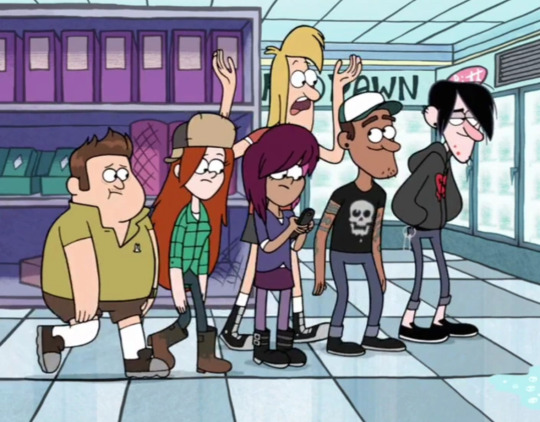

#GF#strawberrystuff#specifically using the college photo of the dynamic duo because i would hope theyd know the market value by the time they were 30+
89 notes
·
View notes
Text
A little too much
Pairing: Kuroo Tetsurou x Reader
Genre: Dark Romance with Food Kink
You stood in the dimly lit kitchen, the only sound being the soft hum of the refrigerator in the corner. Kuroo Tetsurou, the intimidating and charismatic volleyball player, stood before you, his eyes fixed on yours with an unnerving intensity.
He had always been a man of few words, but when he spoke, his deep voice sent shivers down your spine. "I've been waiting for you," he said, his eyes never leaving yours. "I have a craving that only you can satisfy."
As he took a step closer, you could smell the scent of cooking oil and spices wafting from his skin. Your stomach growled in anticipation, despite the trepidation that gripped your heart.
Kuroo's hands moved with precision as he began to prepare a meal, his fingers dancing across the countertops with a sensual grace. He chopped vegetables with swift strokes, the knife glinting in the faint light. The sound of sizzling meat filled the air as he cooked up a storm, each dish more tantalizing than the last.
But it wasn't just about food; it was about control. Kuroo's eyes seemed to bore into your soul as he presented each dish to you, his fingers brushing against yours as you took your first bite. The flavors exploded on your tongue, but it was nothing compared to the thrill of being under Kuroo's command.
As you ate, Kuroo watched you with an unblinking gaze, his eyes drinking in every reaction. He fed you morsels of food from his own fingers, each touch sending sparks through your body. You felt like a puppet on strings, dancing to Kuroo's tune as he orchestrated this twisted culinary ballet.
The meal ended all too soon, leaving you feeling both satisfied and unsettled. Kuroo's hands closed around your wrists like cuffs as he pulled you closer. His lips brushed against yours in a kiss that was both gentle and suffocating.
"You taste better than any dish I've ever created," he whispered against your lips. "And now that I've had a taste... I'll never let you go."
As Kuroo's lips lingered on yours, you felt a shiver run down your spine. His grip on your wrists tightened, holding you in place as he deepened the kiss. The flavors of the meal still danced on your tongue, but it was Kuroo's taste that overwhelmed you - a heady mix of spices and darkness.
He pulled back, his eyes gleaming with a possessive light. "You're mine now," he whispered, his breath hot against your skin. "My ingredient, my dish, my dessert."
Kuroo's hands roamed over your body, tracing the curves of your waist and hips. He touched you like a chef handling delicate ingredients, his fingers probing and exploring every inch of your skin. You felt like a dish being prepared for consumption, and the thought sent a thrill through you.
The kitchen around you grew darker, the shadows deepening as Kuroo's touch ignited a fire within you. He led you to a small table in the corner, where a single chair waited. Kuroo sat down, pulling you onto his lap as he began to feed you again - this time, it was sweet pastries and creamy desserts.
Each bite was a sensual experience, Kuroo's fingers brushing against yours as he fed you. The tastes exploded on your tongue, but it was the feeling of being controlled that truly thrilled you. You were Kuroo's plaything, his toy to be used and savored.
As the night wore on, the food disappeared, replaced by Kuroo's kisses and touches. You felt like a dish being devoured, consumed by Kuroo's hunger for control and possession. And yet, despite the darkness of it all, you couldn't help but feel drawn to him - like a moth to flame.
Kuroo's hands closed around your throat, his fingers gentle but firm. "You're mine," he whispered again, his eyes burning with intensity. "Forever mine."
In that moment, you knew that you were trapped - caught in Kuroo's web of desire and control. But as his lips claimed yours once more, you wondered if escape was even possible... or if you wanted to escape at all.
#Dark Romance#Food Kink#Public Intimacy#Possessive Behavior#Market Setting#Power Dynamics#Sensory Descriptions#yandere haikyuu#yandere kuroo#yandere kuroo x reader#yandere kuroo tetsurou#yandere kuroo tetsurou x reader#kuroo tetsuro x reader#tetsuro kuroo xreader#kuroo tetsurou x reader#tetsurou kuroo x reader#yandere tetsurou kuroo#yandere kuroo tetsuro x reader#haikyuu#yandere haikyuu x reader#haikyuu imagines#yandere x reader#yandere x you#yandere#yandere scenario#yandere imagines
44 notes
·
View notes
Text
The more and more I think about it, because it has been bugging me for a minute, I think the reason why Rhaesaria can happen and Rhaenicent can't -and probably never will- is that Rhaenicent is just too big of an ask. It's too much of a canon divergence and an incredibly massive one at that. They've already changed so much from the books to make their relationship what it is in the show but actually putting Rhaenyra and Alicent together in a romantic relationship would literally derail the plot. Like I literally can't think of a way they could put them together and still accurately portray the Dance. I really don't think it's feasible. Rhaesaria however, can happen because it literally affects nothing, in the grand scheme of things. Nothing about and around the two of them changes. With Rhaenicent, you'd have restructure so many things (again) to not only make it possible but believable to the greater audience. Especially given where the story is right now. The bad fanfiction slander that would further arise from making them cannon would practically snuff out the show. And that's why I believe their relationship can only, and always will be, just subtext.
#i don't ship either ships but it's been bothering me#like they let rhaenyra and mysaria kiss after spending only like 3 episodes together#because they apparently didn't want their dynamic to be queerbaiting#which is fine great even but then wtf is rhaenyra's and alicent's??#especially with the marketing like it's genuinely puzzling#and again i'm saying this as someone who doesn't care about either ship#i don't have any stakes in this#but it's just didn't make sense to me#so this is my take on the possible why#i could be completely wrong tho#rhaenicent#rhaesaria#rhaenyra x alicent#rhaenyra x mysaria#rhaenyra targaryen#alicent hightower#mysaria of lys#house of the dragon
92 notes
·
View notes
Text
I still have no idea how Veracxa actually played out in the show but I’m enamored by the idea that the team spends years fighting like the bitchiest most tenacious most androgynous lesbian ever. And then she becomes Lance’s sister-in-law.
#veracxa#voltron#I’ve always thought of Acxa as being almost like Jessie from pokemon in that she’s Always Fucking There#meaning like the team goes anywhere and then acxa is just There as well for some reason#keith goes to the farmers market planet. he reaches for some space peaches only for acxa to grab them first.#she’s literally there by complete coincidence and then 5 minutes later she's sets the market on fire and nearly killed keith three times#I think Acxa and keith would have the funniest in-law dynamics#because Acxa is the closest keith thinks he has ever felt to being attracted to a woman (because Acxa looks like a twink)#and then likewise keith is the closest thing axca has ever felt to comphet (this is her first time experiencing a Warrior’s Bond)#shitpost#axca
374 notes
·
View notes
Text
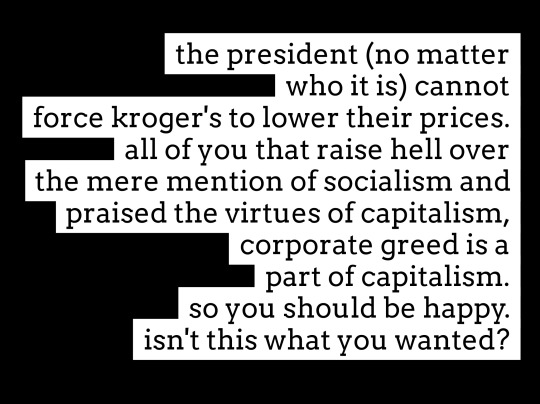

#political commentary#capitalism#corporate power#consumerism#economic policy#socialism#government intervention#market dynamics
135 notes
·
View notes
Text
Hey speaking of dungeon meshi, I think its really fucked up that the story brings up slavery Twice and just glosses over it. Esp when one of said mentions is pointing out that one of the characters OWNS another which makes all their interactions a whole lot less cute.

Anyway I hope Kuro skins Mickbell and makes a rug out of them.
#the other mention is when the canaries are at the dungeon bazaar and there is a mention of a Demi Human Slave Market but we dont see it#which is FUCKED UUUUUPP#but also makes laios being with a kobold and orc child in the final pages of the comic kinda sweet cus it to me implies their presence#has been notmalized in the world and no one thinks of them as an other to be owned or slayed any more#i kinda rlly wish that the comic didnt bring up slavery at all if it wasnt gonna do something abt it#like its such a NASTY concept to have there and not Do something abt#and kuro being Mickbells slave is so fkn VILE cus everyones just okay w it and they treat him like a pet#which is kinda silly cutesy till u realize their actual dynamic
119 notes
·
View notes
Note
COLMAN AS KHAYYMAN

i saw him in that red suit with the cunty glasses blacked out and came to. BLACKED OUT AND CAME TO I REPEAT. if i had the money i would pay all of it to the casting directors to make sure this happens let's start a prayer circle and manifest it with our minds
#inbox#q: black-market-wd40#tv: interview with the vampire#interview with the vampire#iwtv#amc iwtv#colman domingo#brethren. imagine this beauty if you will. comprehend it. then imagine the dynamic with Armand from every angle i say unto you#today the nation of Blasia in any aspect will never fall
14 notes
·
View notes
Note
Hi!! First time in ur inbox- sorry it's such word vomit. I've seen you be so sweet to people in your asks and I thought I'd join with my own thoughts that have been rattling around in my head since last night.
Why is it that the general population see larries as actually, genuinely, crazy and delusional fans? I know it serves it's purpose in maintaining the believability of a closet, but
when i got into the fandom and started going through all the receipts& explanations, I remember still being on the fence for a while, unsure and sort of paranoid about whether I was allowed to believe in it. I can remember telling a friend that asked if I thought it was real: "The craziest part is that you look through everything, read about PR and closeting in the industry, and you are left thinking: Well, holy shit. It's entirely possible that this is true. It wouldn't even be a special case- all of these things that fans theorise about Larry have 100% happened to other celebs."
I understand people not wanting to believe in 'conspiracies' but when it's straight relationships, it's ok? when it's the mainstream media narrative, it's ok? even though artists have told us repeatedly that the media has their own agenda? I'll never get that. How are we the crazy ones? They're the hypocrites.
Because I'm new to the fandom I've been watching old clips on youtube, and I got recommended a video essay on 1D and the whole comment section was full of people saying larries caused gaylor to happen (ew as if we would ever), and comparing what we believe to kpop stans thinking every one of their idols is secretly dating (which btw, yes kpop stans are intense and often fall for easily debunked conspiracies but. statistically speaking, some of those boys have GOT to be fruity.)
It just makes me wonder why people have to come at us like that. Saying all our proof can be debunked... a lot of it can lol but that's more of an issue of younger or naiver people getting obsessed with the idealised romance of H&L and seeing writing on the wall when it's just some accidental smudges. If they don't want to believe us, fine. But why are they so sure they know better than we do?
Hi, love. This would be a PhD thesis if I really broke it down. But I think a couple of the main reasons are that 1DHQ worked overtime on the gaslighting and the story that larries ruined HL's friendship. Then they added in "Louis" tweeting about how Larry is bullshit, and he's straight, and he's had to deny "Larry" a bunch of times over the years. So from the early days, it was considered being a "good fan" to shit on larries. Then, add in that Harry was marketed as a womanizer, Louis was marketed as the world's best boyfriend, and tabloids calling anyone "crazy" who thought they could be anything but aggressively straight. Larries just became the scapegoat.
Add in a sprinkle of homophobia ("stop assigning a sexuality to people" as if "straight" isn't a sexuality) and compulsory heterosexuality, and you've got a perfect storm. Plus, unless you've got a basic understanding of closeting and the way the music/film industries operate and only you've really followed things from early on and cataloged the insane amount of "coincidences," it's easy to explain everything away.
more here
25 notes
·
View notes
Text
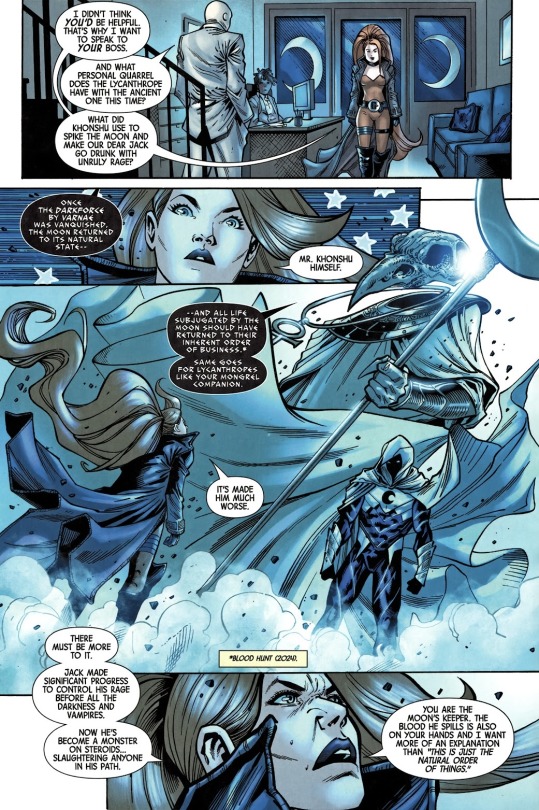
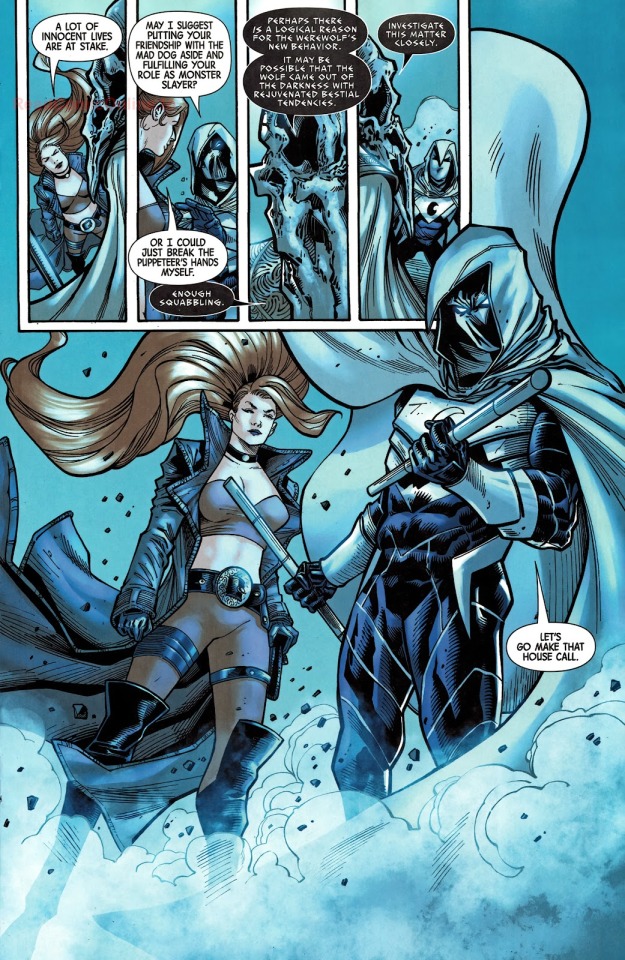
Werewolf by Night: Red Band (Vol. 1/2024), #2.
Writer: Jason Loo; Penciler: Sergio Dàvila; Inkers: Jay Leisten and Aure Jimenez; Colorist: Alex Sinclair; Letterer: Cory Petit
#Marvel#Marvel comics#Marvel 616#Werewolf by Night: Red Band#Werewolf by Night: Red Band vol. 1#Werewolf by Night: Red Band 2024#Moon Knight comics#Moon Knight#Mr. Knight#Marc Spector#Elsa Bloodstone#Khonshu#It’s wild that they vaguely allude to the Moon Knight annual with Jack’s plot to get Khonshu via killing Diatrice#but only very vaguely#and I think that’s wild considering how much that explains Marc’s reaction here#Marc’s no Spidey in that Marc WILL pull the trigger and lethal force is never complete off the table#when it comes to potential courses of action#but Marc — who’s intimately aware of what kind of terrible people can turn things around if given a second chance#since that’s part of his story — will usually go through a couple more options for jumping to «kill on sight»#or in this case encourage others to take Jack out for him by appealing to their sense of responsibility (pffft MARC)#just a bit of an interesting dynamic for him and perhaps he’s so willing to relent and make this so-called house call#in other news I really do love Elsa’s boots#also this is actually a month late with no. 3 (which judging by the cover will also have MK) slotted to have been released#this past Wednesday#I’ll keep an eye out but maybe the delay is due to this being a red band series?#which please don’t mind me with this quick aside#but I find the marketing of red band series so funny like#«this comic is polybagged for your protection! 🚨 Minors DNI! 🙅🏻 The contents of this issue are so objectionable#you WILL be put on a watchlist the moment you buy it!!!! 😤» and you look inside and it’s just ???#maybe I’m just desensitized (and already on perhaps too many watchlists) but there ain’t even entrails (I respect the hustle though haha)
22 notes
·
View notes
Note
If you don't mind me asking what's the uhh. origin of agent fwee


if i recall correctly i think she technically started as an inside joke of my sister and i saying "agent 3" in like, a silly babyish voice?? but in 2018 (about a month or so before i made 14 crush) i made these little joke doodles of agent 3 during class.
she wasn't at all tied to 14 crush until someone had a silly idea that just. happened to line up almost exactly with fwee as a concept, so i brought her up and showed my followers the art above.

people liked her a lot so i ended up keeping her as part of this semi-canon state where i think she exists in the 14 crush universe but she'd never have a real tangible role in the blog (maybe she wouldve had a cameo at some point if it kept going, who knows)
she got a lot of fanart with different designs attached (since the original drawing of her was just agent 3's octo expansion look with a silly face and red ink) so i decided i should give her her own (rather simple and easy to draw) design in 2019 (lifting the color scheme directly from Strange Klug from puyo puyo lol)

and thats where she's at now! just a silly gal who is either just a weird teenager or an immortal all powerful being or anything in between. up to you.



(her birthday art from 2019, 2020, and 2021 respectively. looks like i missed last year... sorry fwee)
#14 crush#bri talks#sometimes i depicted her with mark the marketer octoling as having a father/daughter or maybe older brother/younger sister type of dynamic#but he was a whole other much later thing lol#she was always the more popular of the two anyway#long post
152 notes
·
View notes